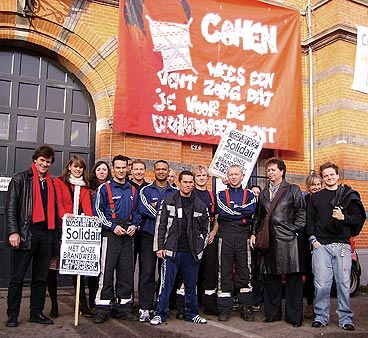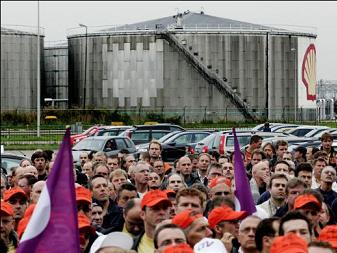
For the past two years the public service unions have been in negotiation with the council of Dutch municipalities for a new collective working agreement. The process has been acrimonious to say the least, with several high profile strike actions by public transport workers, harbour employees and even sanitation workers during Sail 2005. The negotiation point that caused the most difficulties, was the ending the right to retirement at age 55 for those workers in professions which are recognised as being risky and strenuous, workers like firefighters or ambulance crews. Back in the summer, the council of municipalities, which had been dragging its feet on the negotiations, made further negotiations conditional on the unions giving up this right. This was not appreciated, to say the least…
As a result the negotiations dragged out until last week –and the previous agreement terminates this month. The council of municipalities held firm to its desire to scrap the right to retire at 55, partially because it was pressured by the national government to do so, because according to the new age discrimination laws coming into action in January 2006, this sort of arraignment is illegal..
Last week a new agreement was finally reached by the union negotiators and the municipalities, in which those employees who would’ve been able to retire at 55 under the old rules and who had worked for more twenty years would still be able to do so, but everybody else would have to stay on after 55. Workers with less than twenty service years would be forced to trade their job for something less strenuous.
The unions might have agreed to this, but the workers, especially, the firefighters, were less than impressed and started a series of wildcat strikes. The good news is that the pressure of these forced the unions to renegotiate to reach a less onerous settlement. In the new agreement, those firefighters with less than twenty years of service now will be able to partially retire at 55 and fully retire at 59, rather than being forced to work fulltime until 59. A modest victory, as this is still worse than what the firefighters had, but a victory nonetheless.
There are two things that we can learn from this whole fiasco. The first is the dubious role the central
government played in the negotiation process. It is clear that a large reason why the unions failed to keep the right to retirement at 55 was the pressure of the new age discrimination laws, which allegedly would make this agreement illegal. The municipalities made grateful use of this to pressure the unions, but it seems to me this agreement could still be kept by making it voluntary rather than a mandatory retirement. I’m not a lawyer though. At the same time, the central government helped pressure the unions even more by making it financially less attractive for both employer and employees to keep these sort of arraignments in place. All this is not surprising, as the Balkenende government has made a fetish of keeping people working longer.
The second, more hopeful aspect iof this is that it is still possible for workers to put pressure to employers and unions, by not going meekly along with what the union bosses think is good for them, but striking for their rights. It does show the enormous gap there is between the union and the workers though, as you would expect it would not be necessary for the workers to have to do this.

